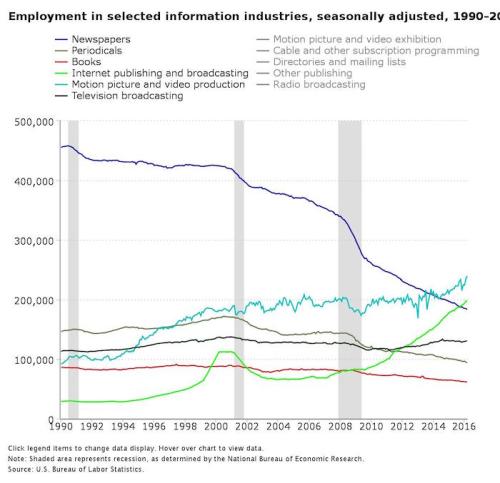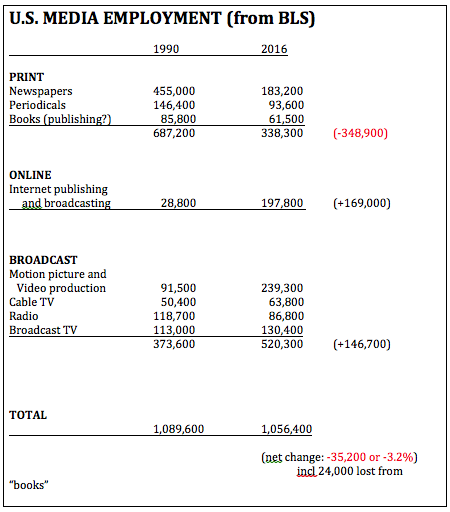By Christopher B. Daly
Two important trend lines have recently crossed, probably forever. The number of jobs in the U.S. newspaper sector has now dipped below the number of jobs in the digital media. Newspapers are not dead, but they are no longer the center of gravity for the news business. Thus ends a dominance that began in the 17th century and reached a peak in the 20th century before cratering in the 21st century.
That is one of the major findings in a new study from the U.S. Bureau of Labor Statistics, documenting what many have long noticed: American newspapers are no longer the driving wheel of American journalism. The past belonged to the printing press, but the future belongs to the web.
Here’s the big picture:

Here are some highlights:
–The purple line that starts so far above the others in 1990 represents all employment in the newspaper industry. It’s worth noting that the BLS counts everyone who works at a newspaper, not just the newsroom crew. So, this is just a rough approximation of the employment situation of journalists — reporters, photographers, videographers, podcasters, editors, producers, and others who are directly involved in gathering and disseminating news. That is a much harder number to track.
–Newspaper employment took a hit in the early 1990s, then sort of plateaued, took a steeper hit when the “tech bubble” burst in 2001 (taking with it a lot of full-page ads), and then really dove in the Great Recession of 2008-9. Since then, the downward trend has slowed a bit, but the trend from 2009 to 2016 gives no reason to think that newspapers are coming back.
–The BLS also provides a helpful monthly chart of the data used to draw all those lines. Here are some salient details I found in the data tables.

–Looking deeper into the numbers, it is heartening to see that the overall numbers of jobs in all these industries combined has not dropped very much, having fallen about 3 percent over 26 years. The biggest proportional hit seems to have occurred in “books” — which I take to mean the publishing industry as a whole. While a small number of journalists make a living by writing non-fiction books, it is probably a very small group that depends primarily on their book royalties.
–The big gainer is “Internet publishing and broadcasting.” It’s hard to imagine how 28,800 people made a living putting stuff online in 1990 (which was before the Web became ubiquitous), but there is no mistaking that web-based activities have been on a surge.
–The other big gainer in the last quarter century has been “Motion picture and video production.” It is unclear from the BLS definitions of its categories what fraction of all those folks could be considered journalists. Probably a lot of them work in Hollywood or other venues where they produce content that is fictional or promotional. Still, it is a rough indicator of where the growth is.
One question that these data raise is this: what will journalists of the future need to know and do?
About a decade ago, my colleagues and I began a deep re-think of our curriculum to bring it out of the days of print newspapers, glossy magazines, film-based photography, and broadcast television. We eliminated our separate, medium-based “concentrations” and decided that all our students should be educated as digital journalists. We tore out our darkrooms, converted to all-digital photography, and decided that all our students need to be competent in “visual journalism.” We ramped up our instruction in shooting and editing video. We converted our student radio station to digital and embraced podcasting. We decided that essentially all our coursework should be multimedia. Like other journalism programs in U.S. universities, we found that it was not easy, but it was a matter of survival.
As a specialist in the history of journalism, I spend a lot of time thinking about the centuries when the newspaper ruled the field. The newspaper had a good long run, but it is clearer every year that newspapers not only documented history, they are history.










